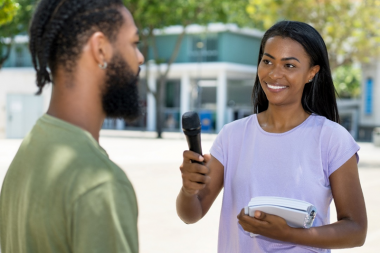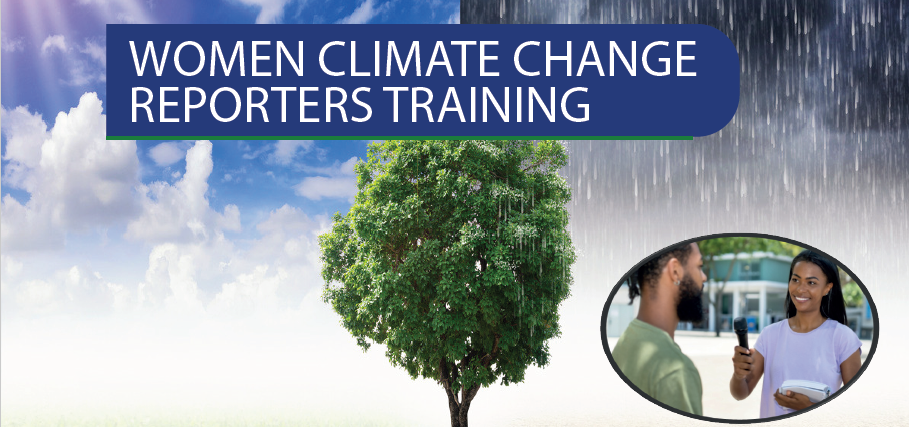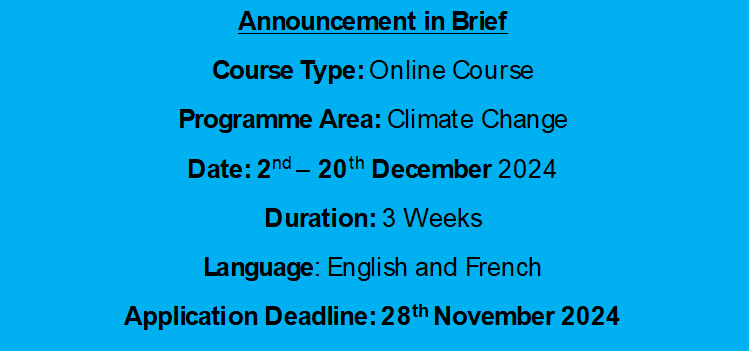Registration Link
Background
ACPC, in collaboration with its partners, has been at the forefront of efforts to promote climate change knowledge and awareness across the Africa continent. In 2016 for example, the ACPC convened a training of trainers (ToT) event on “Mainstreaming Climate Information and Services (CIS) into legislation, development policies and plans”, which was attended by legislators and youth groups drawn from across the continent. In tandem with this activity, the Centre, under its then DFID-funded Weather and Climate Information Services for Africa (WISER) programme commissioned a collaboration with the UNCC: Learn Partnership to co-develop a self-paced online learning module on “Climate information and services”. The learning was used to undertake climate information services training of civil society in Kenya, parliamentarians in Pretoria, Uganda and Sierra Leone, media in Cameroun and agriculture experts in Senegal. The online module has been completed by over 6,000 learners globally.
Climate change reporting involves engagement with stakeholders, acquisition of knowledge, lessons and key messages, which form the basis for development of knowledge products, packaging and dissemination. The media in this respect forms a critical link in channeling information and knowledge to various constituencies and communities that are increasingly ravaged by extreme climate and weather events. At policy level, heightened climate change awareness of public officials facilitates integration of climate policies incorporating demand-led, evidence-based information into economic and development planning. In most parts of the continent, the level of skills and awareness of the drivers of climate change remains inadequate to respond to the widespread impacts of extreme weather events, such as droughts, hurricanes and heat strokes.
Against the above background ECA in collaboration with PACJA is calling for applications by African women climate change media practitioners for an opportunity to attend the two weeks training course.
Learning Objectives
The overall objective of the training is to deliver virtual training to “strengthen the capacity of women climate change reporters” in the African region.
At the end of the course, participants will be able to:
- Demonstrate understanding of the science of climate change and its global and regional impacts.
- Understand the nuances of global climate governance and negotiation frameworks and accurately report on them.
- Identify and explore the human dimensions of climate change, including gender perspectives.
- Engage in cross-border collaboration and peer learning among female journalists reporting on climate change.
- Plan and execute climate change investigative journalism assignments.
- Understand stakeholder mapping to the most effective dissemination channels (print, radio, TV and online).
- Use contemporary tools and techniques for accurate, clear, and impactful reporting on climate change.
Course Structure and Content
This online course is designed to empower female journalists across Africa with the tools, knowledge, and skills required to effectively report on climate change issues. Through a comprehensive blend of theory, practical exercises, and peer learning, the course will provide a solid understanding of climate science, climate policies, and gender dimensions in climate change reporting. The course will also focus on developing storytelling techniques that are both data-driven and human-centred, ensuring journalists can produce compelling narratives that resonate with diverse audiences.
The course is divided into self-standing interactive lessons per module, which are user friendly and include full reading lists, power point presentation slides, lecture notes, guidelines for discussion.
Target Audience
The course is designed for women journalists across Africa, regardless of age, working in all media types, including print, broadcast, and digital platforms.
Acceptance to the Course
Until the registration deadline, participants are accepted to the course on a rolling basis. Applications must be completed exclusively on IDEP online application platform at Link
Contact Information
Training and Research Division
Tel: +221 33 829 55 00 / Fax: +221 33 822 29 64
Email: catherine.lalyre@un.org with copy to diaw4@un.org and lou.zah@un.org
N.B.: IDEP strongly encourages and supports the participation of suitably qualified female officials in its capacity development and training programme.
Documents
WCCR 2024 Brochure [English] | [French]


